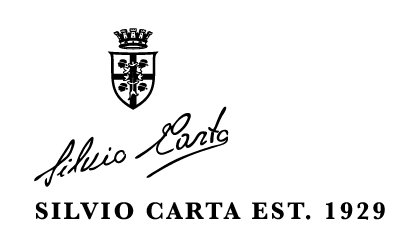
COMPANY
It was the early 1950s when Silvio Carta founded the eponymous company in Baratili San Pietro, immediately devoting himself to the most traditional of the local wine productions: Vernaccia di Oristano. An amber gold that embodies nobility and generosity, which immediately charms and conquers the palate.The skilful vinification, the long resting in a barrel and the careful and loving care by the Maison Silvio Carta have made this incredible wine an authentic glory of Sardinian oenology.
Sixty years have passed since then, but Vernaccia still remains a family matter. But now there is more. After more than half a century, Silvio, together with his son Elio – the latter at the head since 1972 – still devote themselves to the production of the greater Vernaccia di Oristano DOC. However, thanks to a careful look towards innovation and the loving care of very deep passions, today the Silvio Carta company is also synonymous with Mirto ‘riserva’, London Dry Gin, Vermouth and other typical spirits distributed all over the world as precious examples of an ancient and luxuriant land: today, the world smells of juniper, myrtle and citrus fruits from Sardinia thanks to the excellence of Silvio Carta.
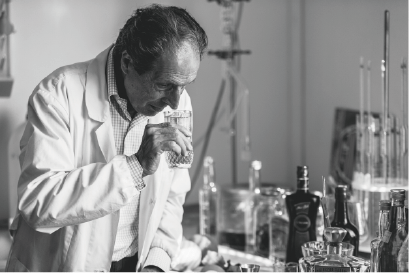
THE LAND
Warmed by the sun, drawn by the wind, scented by the Mediterranean maquis, enriched by the salt coming from the sea. Our Land. It is our Sardinia.
THE TIME
Marked by harvesting, measured by old chestnut barrels, forged by distillation at low temperature. Our time. It is our value.
THE KNOWLEDGE
Shaped by studying, protected by experience, tempered by tiredness, aroused by passion. Our knowledge. It is our wisdom.
THE TECHNIQUE
The Land, the Time, the Knowledge. They have been our Technique for over 50 years.
OUR PATH
- 1952 Silvio Carta founded the winery
- 1981 The liqueurs production begins. Elio first Silvio Carta’s son join the company
- 2012 New Headquarters. Restyling of the packaging, bottles, labels. International products such as Gins, Vermouths, Bitters are born
- 2020 The first food sanitizer: Sterile 85°
- 2023 Whisky From Sardinia Single Malt
THE FAMILY
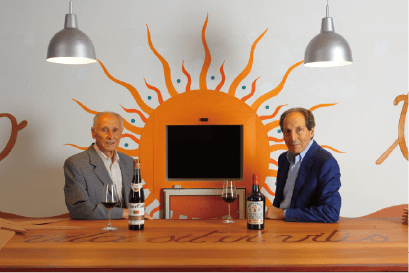
We are a family winery and distillery located on the western coast of Sardinia.
Silvio Carta, the founder, was born in 1929 in Baratili San Pietro, a small agricultural center located about 10 km from Oristano, from a peasant family.
It was the early 1950s when he founded the eponymous company, immediately devoting himself to the most local and traditional wine production: Vernaccia di Oristano, an amber gold that embodies nobility and generosity, which immediately charms and conquers the palate.
The skillful vinification, the long resting in Sardinian chestnut barrels and the careful and loving care by the Silvio Carta winery, have made this incredible wine an authentic glory of Sardinian oenology.It soon became the most sought-after wine in the region and the town of Baratili San Pietro was discovered and renowned throughout the island and beyond.
At the end of the seventies, there was a change in the lifestyle of consumers that led Silvio Carta to take this opportunity: to create the distillery and liquors factory for the production of liqueurs and distillates typical of the Sardinian land.
Over time, his son Elio (now CEO) joined the founder and started the production of traditional liqueurs and high quality spirits starting from a very simple idea, to transform the fruits of nature into products capable of representing Sardinia in the world. Each bottle that is produced is the story of an entire island.
High-quality products, with elegant packaging and natural ingredients were the keys to distillery’s success. Each spirit is crafted using only the finest ingredients from Sardinia and is the result of tireless care and attention to detail.
The company philosophy that governs Silvio Carta's productions is admirably summed up in the historical claim: “Harmony of Nature”.
Our products are born from the Sardinian tradition and from the deep respect for the territory.The qualities of botanicals, herbs and spices used by Silvio Carta contain all the aromas and flavors of the Sardinian territory, for a unique tasting experience of its kind. They are our key element for obtaining high quality products.Land, nature and knowledge have been our technique for over 70 Years.
Since 2011 the Silvio Carta company has fulfilled its dream of separating its productions through the use of two distinct locations, with undeniable advantages from the point of view of production and company logistics.
Thus, while the historic plant of Baratili San Pietro, of about 5,000 square meters of covered area, returns to the ancient destination, wine production and aging of Vernaccia wine in small chestnut barrels (more than 700 which are 80/90 years old), the brand new Zeddiani factory, equipped with the most advanced production technologies and packaging, with around 20,000 square meters of covered surface, concentrates the production of liqueurs and spirits.
Both the winery and distillery are equipped with a photovoltaic system capable of powering production with maximum energy savings and zero carbon dioxide emissions into the atmosphere.The company had conquered the hearts of the public beyond regional borders thanks to the broad range of excellent quality products.Since Silvio Carta founded the company, tradition and innovation have gone hand in hand to guarantee quality and goodness. Nowadays, we are the third generation working together with new ideas and projects, always with an eye to the story of our grandpa and his great experience of life.
Silvio Carta, who is now 92 years old, is in charge of taking care of all the plants which surround the distillery. Such as lemon plants, liquorice plants, myrtle plants and all the botanicals we use to make our gins and vermouths.Picking fresh juniper berries and distilling them right away allows us to have gins with an unmistakable scent. As well as using our centuries-old Sardinian chestnut barrels to age, not only Vernaccia wine, but also our aged gins, grappa and brandy.
The way the Carta family operates has always respected the environment. It was not really a coincidence, but the arrival point of a long journey, the launch on the market, several years ago, of the first organic Mirto Rosso. A record that constitutes a flagship of which the Silvio Carta Company is understandably proud.Silvio Carta can be defined as a GREEN company in harmony with nature.
ERRITORY
The Province of Oristano in Sardinia is known for its wild and pristine beaches. It makes sense that a distillery found in this area would reflect its landscape.
An area that is particularly suitable for the cultivation of renowned vine varieties and the spontaneous development of officinal plants. The clear sea, the sharp mountains covered by intricate vegetation of wild beauty, the winds that blow from different directions for the majority of the year and the bright sun that shines in every season allow the flora and fauna of the island to have organoleptic properties that are unique in the world and impossible to imitate.
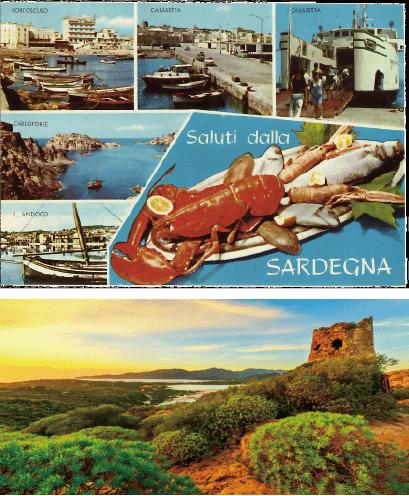
CULTURE
Sardinia is famous for having evidence of human presence since very ancient times, of which “Nuraghi“ (ancient megalithic edifices found exclusively on the Italian island of Sardinia) are the most significant and well-known image among the broad public.
However, the island's charm doesn't only come from the unique beauty and variety of its maritime areas, but also from other peculiar elements that make it a completely unmistakable world, including its culture, habits and traditions, folk costumes that are still, even now, jealously guarded, archaeology and, last but by no means least, its eco gastronomy.
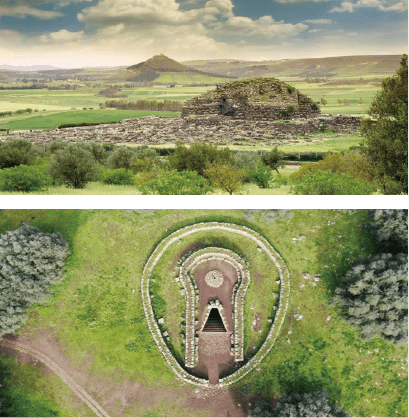
OUR BOTANICALS
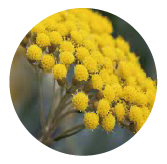
Helichrysum
Also known as Perpetuini d’Italia, Helichrysum italicum is a spontaneous plant typical of the Mediterranean scrub, known and used since ancient times for its numerous medicinal properties. Its typical yellow-golden flowers have always been linked to the cult of the Sun and a symbol of eternity.
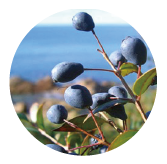
Myrtle
Myrtus Communis is an evergreen shrub that grows spontaneously in the Mediterranean area and, in a particularly luxuriant and abundant way, in Sardinia. The flowers, leaves and berries are used for myrtle. The collection of the latter takes place from November to January, while the flowers bloom in the summer.
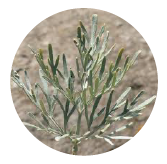
Artemisia arborescens
Perennial herbaceous plant with shrub character, heliophilic, native to the western Mediterranean basin and widely spread throughout Sardinia. It reaches and exceeds 150 cm in height and is characterized by its bushy habit, large flower heads and narrow leaf segments.
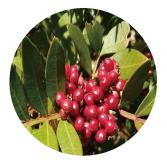
Lentisk
Aromatic plant of the Mediterranean flora typical of Sardinia in which it is indicated, among others, with the name of su moddìttsi. Evergreen shrub, it is characterized by a bushy habit that can reach 3-4 meters in height: the leaves and fruits give off an intense resinous and aromatic scent.
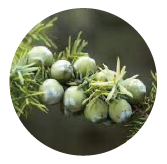
Juniper
Juniper berries, called galbuli in botany, are fleshy fruits, aesthetically similar to blueberries and obtained from plants of the Juniperus genus. Much loved for their properties by monks and abbots, they are widely used in the culinary environment as spices, for the extraction of the essential oil of the same name and as a herbal remedy.
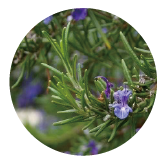
Rosmarino officinalis
Queen of aromatic plants, Rosmarinus officinalis is a plant native to the Mediterranean countries and considered an indigenous species in Sardinia, where it grows spontaneously along the coast and up to 1500 meters above sea level.
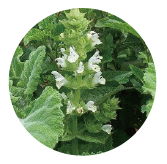
Salvia desoleana
Aare endemic species of Sardinia, this perennial and evergreen herbaceous plant with a bushy appearance, has quadrangular hairy stems, with large opposite and hairy leaves with a characteristic intense aroma.
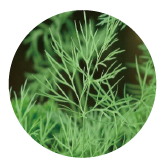
Wild fennel
Aromatic plant that belongs to the Umbelliferae family and whose botanical name is Foeniculum Vulgare, very easy to find in Sardinia and has always been used in cooking and herbal medicine.
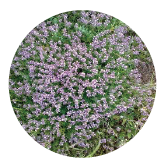
Sardinian wild thyme
Belonging to the wild thyme group, it is an endemic species of Sardinia. It is a small shrub with a very branched trunk, widespread mainly on the arid and windy slopes of the island from 800 to 2000 meters above sea level. Flowering occurs from spring to early autumn.
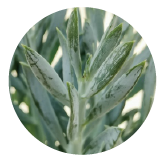
Senecio serpens
Evergreen shrub plant, characterized by the typical light green color and the soft and pruinose consistency of its pointed leaves that start from long stems, the Senecio Serpens can exceed 30 cm in height and retains a compact habit. Starting from summer it can generate small white flowers.
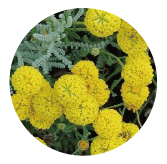
Santolina insularis
An exclusive endemic species of Sardinia, this small shrub plant stands out for its bright yellow flowers and its intense aromatic smell. The name seems to derive from sanctus (saint) and linum (flax), referring to the therapeutic properties of the island plant.
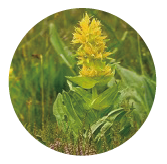
Gentian
Very ancient perennial herb, 40 to 150 cm high, gentian blooms for the first time at ten years of age and is characterized by being a rare and highly sought-after plant for the medicinal properties of its roots.
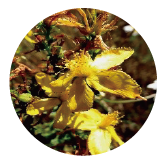
St. John's Wort
Also known as Iperico, St. John's wort is a small flowering plant of the genus Hypericum perforatum and also grows spontaneously in Europe and especially in Sardinia. As the old saying goes, St. John doesn’t want deceptions, and St. John's wort doesn’t lie!
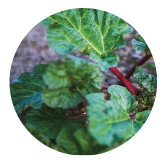
Rhubarb
Perennial plant native to China (where the first information on its therapeutic properties comes from), grows both in Europe and Asia, rhubarb belongs to the Polygonaceae family and is composed of erect red stems, a large underground root or rhizome, and large leaves of intense green color sometimes with red hues.
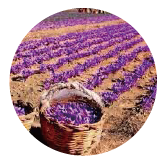
Saffron
With very ancient origins, dating back to the Phoenicians who first introduced it to the island, Sardinian saffron is, with its ruby red pistils, heady scent and unmistakable aroma, undoubtedly one of the most precious spices in the world.
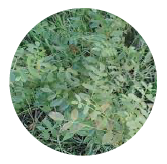
Licorice
A perennial herbaceous plant whose roots are used, licorice is native to the Mediterranean and Middle Eastern area and is considered one of the oldest herbal remedies. It was even used already in ancient Egypt to make a liquorice-based liqueur, intended, just think about who, precisely for the pharaohs.
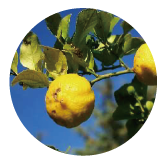
Lemon
An evergreen tree typical of the warm areas of the Mediterranean, the lemon is a re-flowering plant that presents, in the right climatic conditions, a continuous vegetation with fruits that ripen in all seasons. Its fruit, also called lemon, is characterized by an oval shape, smooth or sometimes wrinkled, yellow and fragrant rind, a spongy white intermediate tissue divided into segments in which the pulp, acidulous, yellow-citrine and the seeds are found, oval and smooth
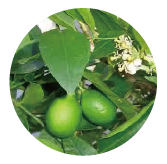
Lime
Citrus aurantifolia is a perennial and green fruit plant always native to Asia and cultivated in Europe and Italy in regions characterized by a mild winter climate. The fruits or limes have a spherical or elliptical shape, flattened at both ends, with a skin rich in essential oils, smooth, thin and green or yellowish green. The pulp is juicy, decidedly aromatic and acidulous.
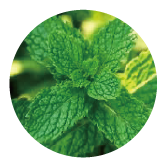
Peppermint
Perennial herbaceous aromatic plant belonging to the Labiate family, peppermint is native to the Mediterranean basin and prefers territories in temperate climates. Compared to other types of mint, it has a higher menthol content and is one of the most used medicinal plants.
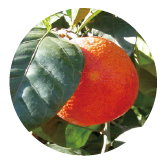
Blood orange
Citrus fruit characterized by a peculiar red pulp, it is characterized by its darker color, the most intense aroma and above all for its bitter taste. The plant was cultivated by the Arabs as early as the ninth century and was imported to Italy in the early years of the second millennium. With their surprising mix of vitamins, red bitter oranges are a truly exceptional fruit, so much so that they have become the symbol of healthy eating.
LIQUEURS
HARVEST
Selection, quality, and freshness control.
HERBS, BOTANICALS, AND CITRUS
Hand-picked from our botanical garden fresh in the morning.
INFUSIONS
Hydroalcoholic in sealed rotor tanks and infusers.
WAITING AND TASTINGS
Visual, olfactory and taste-olfactory examination.
BLENDING
The search for the result.
BOTTLING
Storytelling packaging design.
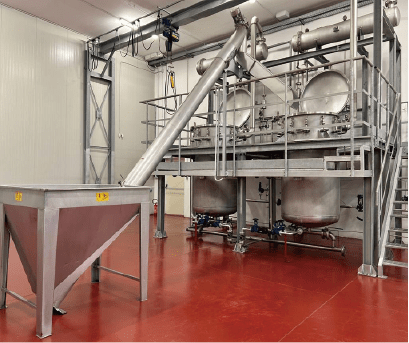
First Step
Botanicals and Citrus
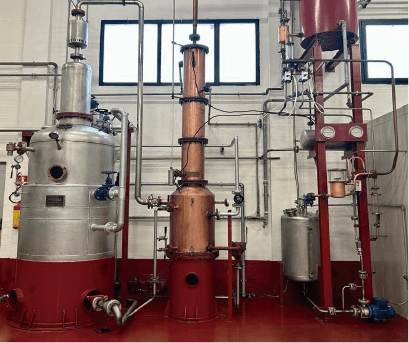
Second Step
Distillation
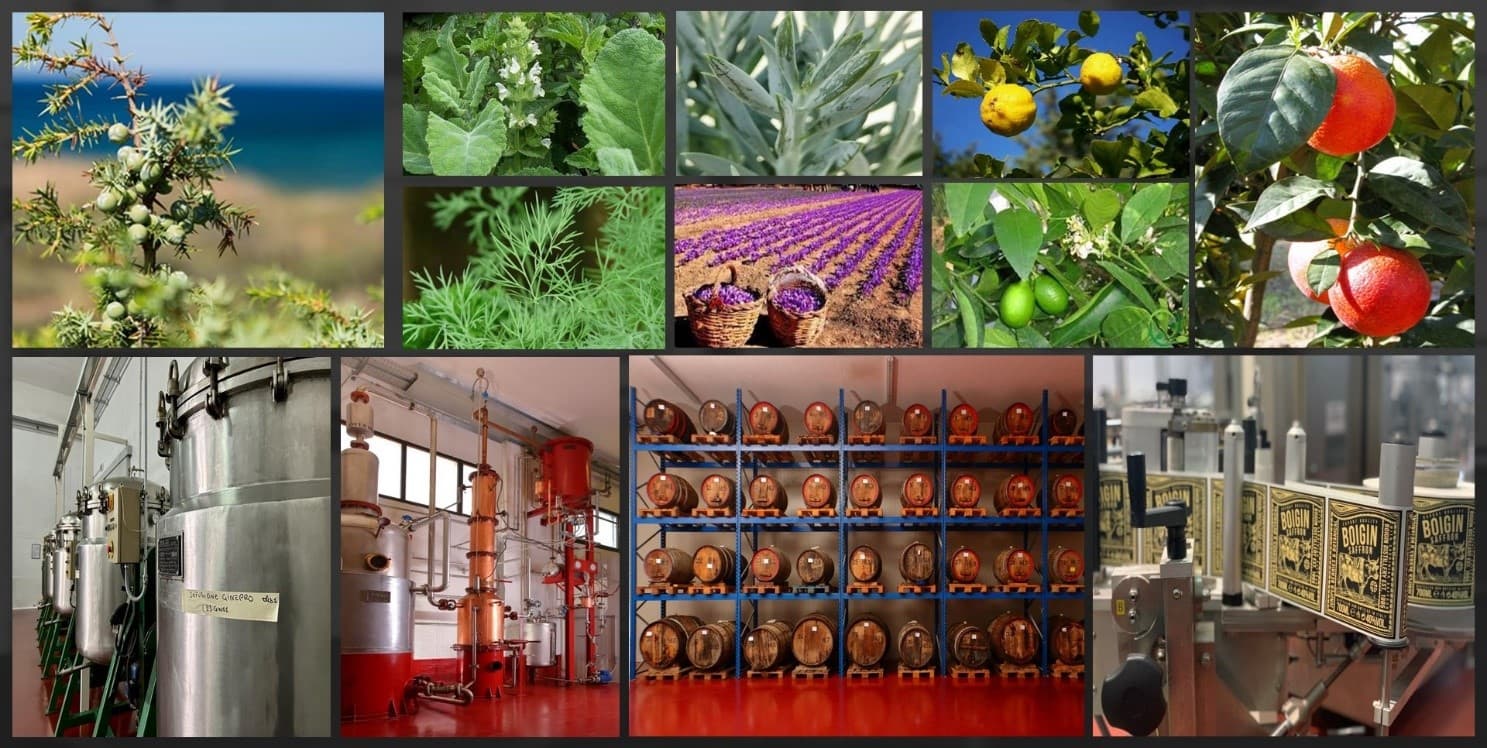

Picture1:
- The third generation, Nino Mason Carta
- The import director of 99 Bottles, Amanda Wammer
- The founder, Silvio Carta
- The third generation, Alberto Mason Carta
- The second generation, now CEO, Elio Carta
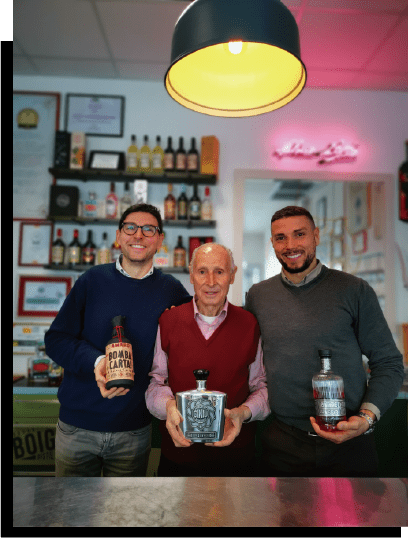
Picture2:
- The third generation, Alberto Mason Carta
- The founder, Silvio Carta
- The third generation, Nino Mason Carta
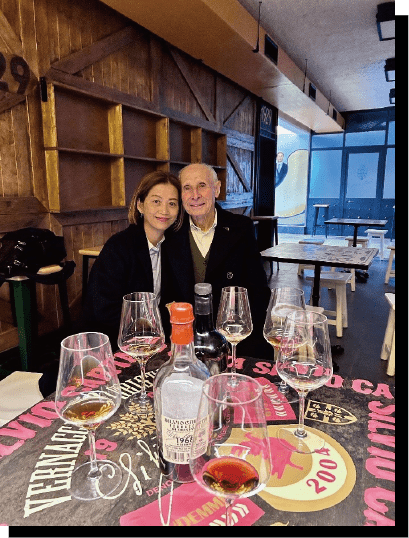
The founder, Silvio Carta and import director of 99 Bottles, Amanda Wammer.
